Garage rock is a raw and energetic style of rock music that flourished in the mid-1960s, most notably in the United States and Canada, and has experienced a series of subsequent revivals. The style is characterized by basic chord structures played on electric guitars and other instruments, sometimes distorted through a fuzzbox, as well as often unsophisticated and occasionally aggressive lyrics and delivery. Its name derives from the perception that groups were often made up of young amateurs who rehearsed in the family garage, although many were professional.

Paul Revere & the Raiders were an American rock band formed in Boise, Idaho, in 1958. They saw considerable U.S. mainstream success in the second half of the 1960s and early 1970s. The band was known for including Revolutionary War-style clothes in their attire.

The Music Machine was an American rock band formed in Los Angeles, California in 1966. Fronted by chief songwriter and lead vocalist Sean Bonniwell, the band cultivated a characteristically dark and rebellious image reflected in an untamed musical approach. Sometimes it made use of distorted guitar lines and hallucinogenic organ parts, punctuated by Bonniwell's distinctively throaty vocals. Although they managed to attain national chart success only briefly with two singles, the Music Machine is today considered by many critics to be one of the groundbreaking acts of the 1960s. Their style is now recognized as a pioneering force in proto-punk; yet within a relatively short period of time, they began to employ more complex lyrical and instrumental arrangements that went beyond the typical garage band format.
The Lollipop Shoppe was an American garage rock band formed in Las Vegas, Nevada, in 1966.

The Modern Folk Quartet was an American folk music revival group that formed in the early 1960s. Originally emphasizing acoustic instruments and group harmonies, they performed extensively and recorded two albums. In 1965, as the Modern Folk Quintet, they ventured into electric folk rock and recorded with producers Phil Spector and Jack Nitzsche. Although MFQ received a fair amount of exposure, their rock-oriented recordings failed to capture their sound or generate enough interest and they disbanded in 1966. Subsequently, MFQ re-formed several times and made further recordings.
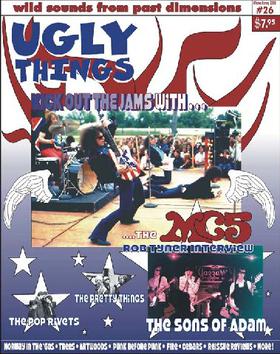
Ugly Things (UT) is a music magazine established in 1983, based in La Mesa, California. The editor is Mike Stax. The magazine covers mainly 1960s Beat, garage rock, and psychedelic music. The name Ugly Things is a pun that refers to the band The Pretty Things.

New Colony Six is an American garage and later soft rock band from Chicago, formed in 1964. Original members were Ray Graffia Jr. (vocals), who was born March 28, 1946; Chic James (drums); Pat McBride (harmonica); Craig Kemp (organ); Wally Kemp (bass); and Gerry Van Kollenburg (guitar), who was born June 26, 1946. Ronnie Rice replaced Craig Kemp in 1966. There were numerous changes in the lineup over the years. Richie Unterberger characterized the group's sound as "a poppier American Them with their prominent organ, wobbly Lesley-fied guitar amplifications, and rave-up tempos", later devolving into "a cabaret-ish band with minor national hits to their credit by the end of the 1960s." Like Paul Revere & the Raiders - with whom NC6 shared a two-flat before either band hit the charts or knew that the other had nearly identical stage wear, they wore colonial outfits on stage.
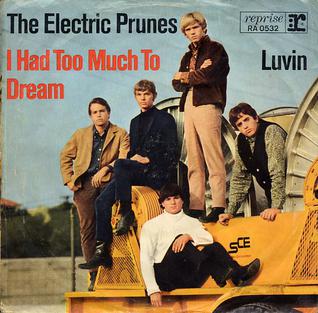
"I Had Too Much to Dream (Last Night)" is a song written by Annette Tucker and Nancie Mantz which was recorded in late 1966 by the American garage rock band the Electric Prunes. Released as the band's second single in November of that year, it reached number 49 in the UK and peaked at number 11 on the Billboard Hot 100 the week ending February 11, 1967. It was also the lead track of the band' 1967s debut album, and became more widely known as the opening track on the 1972 Nuggets compilation of 1960s garage rock and psychedelic rock.

If I Were a Carpenter is an album by American singer Bobby Darin, released in 1966. It was a significant change in direction for Darin considering his previous album was a collection of show tunes.
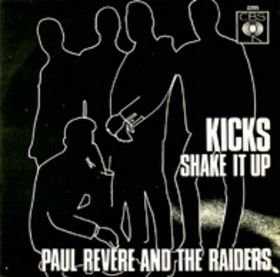
"Kicks" is a song composed by Barry Mann and Cynthia Weil, best known as a 1966 hit for American rock band Paul Revere & the Raiders.

Fortune And Maltese are an American garage rock band from Detroit, Michigan, formed in 1993 in Kalamazoo, Michigan.
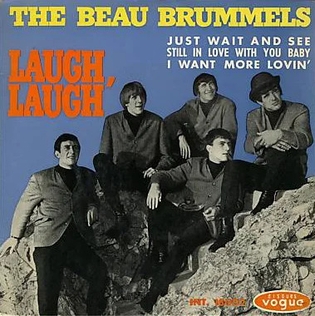
"Laugh, Laugh" is a song by American rock group the Beau Brummels, written by guitarist Ron Elliott and produced by Sylvester Stewart, later known as Sly Stone. Released in December 1964 as the band's debut single, the song reached number 15 on the U.S. Billboard Hot 100 chart the following February. "Laugh, Laugh" was the first hit single to come out of the emerging San Francisco music scene in response to the British Invasion. The song was later included on the band's first full-length album, Introducing the Beau Brummels, released in April 1965.
Butch Engle & the Styx was an American rock band formed in 1963 in Mill Valley, California. Originally named The Showmen, the members were Butch Engle (vocals), Bob Zamora, Mike Pardee (organ), Harry "Happiness" Smith (bass), and Rich Morrison (drums). The band released three singles before breaking up in 1968. A compilation album featuring all of the band's recordings, No Matter What You Say: The Best of Butch Engle & the Styx, was released in 2000.

Goin' to Memphis is the eighth studio album by American rock band Paul Revere & the Raiders. Produced by Chips Moman, with the exception of one song that was produced by Terry Melcher, the album was released in 1968 and reached number 61 on the U.S. albums chart.
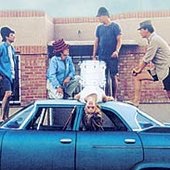
The Driving Stupid was an American garage rock band formed in New Jersey in 1966. The group issued one cult favorite single called "Horror Asparagus Stories" that is most known for its absurd lyrics and psychedelic instrumentals. Though short-lived, the band's sole release has been included on numerous compilation albums. Previously unreleased material by the band was also issued in 2002.
The Electras were an American garage rock band formed in Ely, Minnesota in 1962. The group recorded between 1965 and 1967 during their musical career, including their most-known tune "Dirty Old Man". The band, which also worked under the moniker, 'Twas Brillig, released a version of the song "Action Woman", a composition that was made into a garage rock classic by the Litter, and has consequently caused the two groups to be wrongly associated with each other.

"Action Woman" is a song by the American garage rock band the Litter, written by their record producer Warren Kendrick, and first released as the group's debut single on Scotty Records in January 1967. The song also appeared on the band's first album Distortions. Although "Action Woman" never broke out on the national charts, it is now revered as a classic piece of the musical genre of garage rock. Accordingly, the composition has appeared on several compilation albums – most famously as the opening track on Pebbles, Volume 1, incorporating a skip in the recording – and has been the subject of cover versions.

Alias Pink Puzz is the eleventh studio album by Paul Revere and the Raiders.
The Wilde Knights were an American garage rock band from Longview, Washington, who were active in the 1960s. They emerged from a group known as the Furys and later the Pipers VI, who recorded several frat rock records. After becoming the Wilde Knights, they wrote and recorded two songs in 1965 which were both released as singles that year and are now recognized as garage rock classics, "Beaver Patrol" and "Just Like Me", the latter of which later provided a huge hit for Paul Revere & the Raiders. In the late 1960s they evolved into Genesis, the King Biscuit Entertainers, and American Cheese, and issued records under those various names.
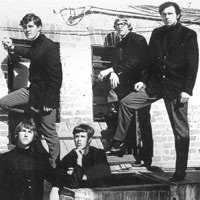
The E-Types were an American garage rock band formed in Salinas, California, in 1965. The group's sound combined striking three-part vocal harmonies and Jody Wence's jangling keyboards, with professional production techniques that were outside of the garage band norm. During the E-Types' recording career, the band released five singles, including their most notable record "Put the Clock Back on the Wall". Although the band was short-lived, the E-Types had a profound presence in San Francisco's live scene and, years after their disbandment, the group recorded a reunion album.















